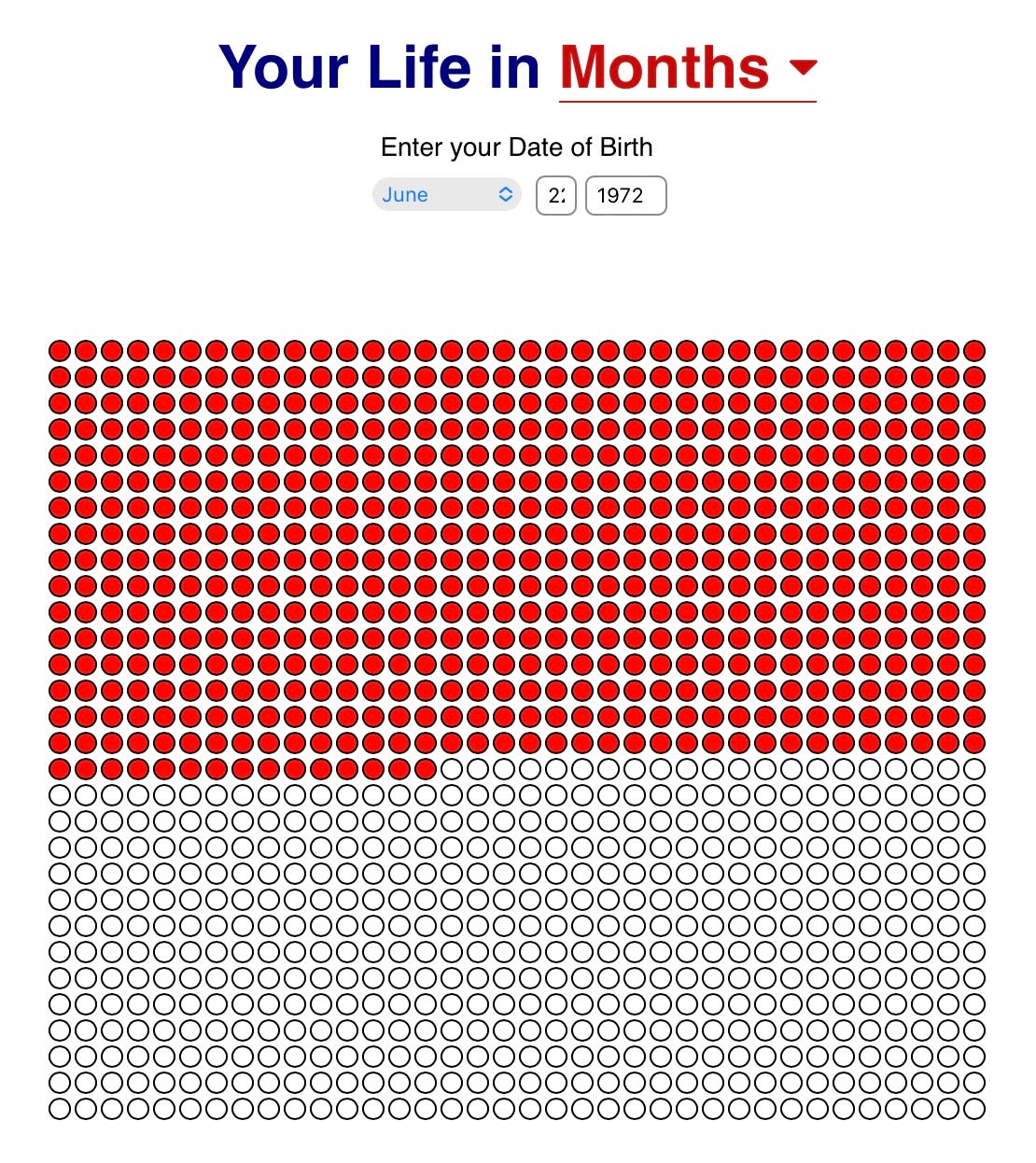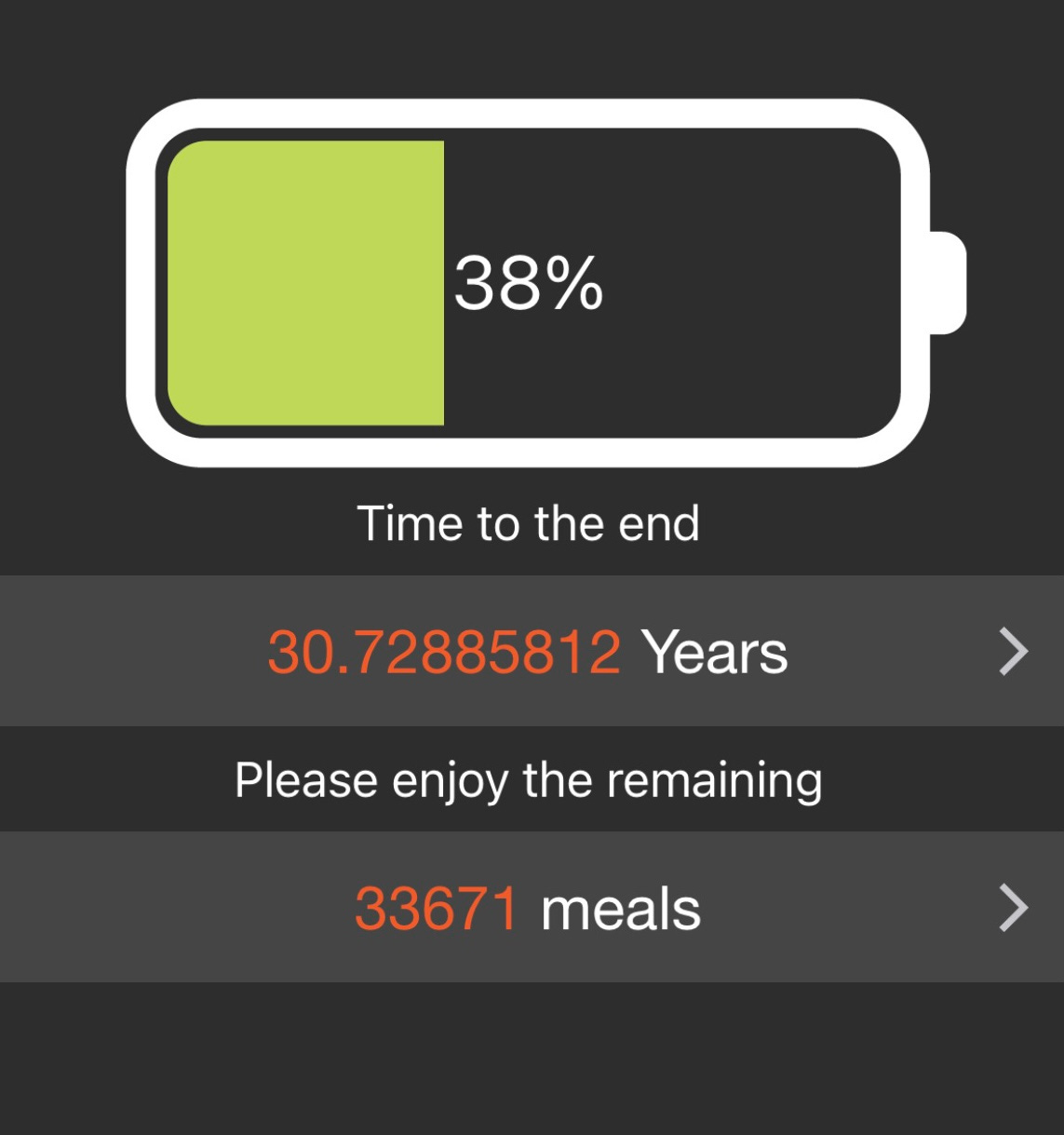Mental Pivot #48: Shifts in Perspective
Taking stock of your time and the Overview Effect, a guide to memory palaces, and keeping your head in the attention economy.
I recently picked up a copy of Oliver Burkeman’s book, “Four Thousand Weeks: Time Management for Mortals.”
In the introduction, the author reminds the reader that life is absurdly short. Per the title, 4000 weeks short assuming an 80-year lifespan (4160 if we’re being precise, along with extra days for leap years).
I don’t often think of lifespan in terms of weeks or even months, but thinking about lifespan in terms of weeks is sobering.
It reminded me of a fantastic Tim Urban article from 2014, Your Life in Weeks, which included clever visualizations illustrating how much time we’ve been given, how much we’ve already used, and how much time we have left to live.
Inspired by Burkeman and Urban, I decided to take stock of time by trying out some tools that create a rudimentary “life calendar” that shows how much time you have left.
Bryan Braun’s Your Life in Years/Months/Weeks takes your birthdate and shows you how much time you have left using an (ambitious) 90-year lifespan. You can toggle between years, months, and weeks.
Zhenlai Xia’s Countdown to Zero app (iOS) takes your birthdate and lets you adjust your lifespan (I chose 80 years). Despite some silliness with the decimal precision, the app also shows amusing stats like remaining meals, weekends, and times to have sex (not sure how he calculates that figure!).
This exercise wasn’t meant to scare or alarm. Mostly it was just an attempt to shift my perspective, take stock, and be realistic about what I have to work with.
There’s a well-known mental shift experienced by astronauts and known as “The Overview Effect.” The idea is that, the experience of viewing Earth from space changes your perspective on the world and your place in it.
Astronaut Alan Shepard had this to say:
I realized up there that our planet is not infinite. It’s fragile. That may not be obvious to a lot of folks…we look pretty vulnerable in the darkness of space.
Despite the commercial efforts of Jeff Bezos, Richard Branson, and Elon Musk, I can’t imagine traveling into space in my lifetime to experience the Overview Effect firsthand. That said, the broader principle underlying the effect—a glimpse from an overarching perspective—is one that I can eagerly embrace. It’s a much-needed reminder to zoom out from time to time to regain my bearings and find clarity.
Further exploration on this topic:
On the Shortness of Life: Timeless essay by the Roman Stoic, Seneca the Younger. This is a translation by John W. Basore.
What Are You Doing with Your Life: Animated video from the Kurzgesagt channel on YouTube, which expands on Tim Urban’s ideas with some cool visualizations.
The Overview Effect: A short 20-minute documentary film on YouTube featuring interviews with astronauts and Frank White (who coined the term and authored a book on the topic).
Thinking Tools:
An Ultimate Guide to Memory Palaces: Sergiy Cheredko delivers an introduction to this classic memory technique. For the uninitiated, a memory palace is a way of improving memory by using visualization, spatial representation, and association. The technique dates back to ancient Greek and Roman times.
The Power of Putting Yourself in Someone Else’s Shoes: Tim Harford discusses human egocentrism and “The Curse of Knowledge.”
When You’re Confused, Clarify Your Intentions: Steve Pavlina reminds us to periodically pause and clearly articulate what we want. In effect, write down or speak your intentions aloud to make them unambiguous: “when we bring clarity to our minds first, we can clearly communicate our desires to reality, and reality can see that we’re being honest and respond in kind.”
The Attention Economy:
How Our Need for Attention Drives Us Crazy: Ed Zitron writes about the constant push and pull dynamic, where the creative act must be balanced between what we really want to say and the actual outcome we’re hoping for.
On the Internet We’re Always Famous: Chris Hayes riffs on the ideas of McLuhan and Postman, that the medium influences and shapes the nature (and quality) of discourse. At the heart of the internet experience are messy interactions between strangers, misplaced expectations, and a misunderstanding of the online social dynamic.
On Solitude: Eric Torenberg (founder of Village Global and On Deck) sings the praises of device-free time for introspection. He calls these moments “solos,” a way to channel your inner-Thoreau—it’s his way of escaping the attention economy to reinvigorate creativity and gratitude.
Revenge Bedtime Procrastination: Anne Helen Peterson writes about a phenomenon where people sacrifice sleep for free time (usually spent endlessly scrolling on a phone) when hectic work schedules leave little room for personal time.
Odds & Ends:
Bain & Company’s 2021 Global Technology Report is a 92-page report on general technology trends from a business standpoint. The key message is that technology is now pervasive across all business sectors and organizations able to effectively seize upon these innovations will be the winners going forward (I get it, that’s not a particularly novel thesis). The usual suspects are here: cloud infrastructure, platform strategies, and SaaS (software as a service) models. Informative graphs and the highlighted corporate initiatives are the stars here.
Photographer Eric Kunsman has a compelling online gallery chronicling the twilight of the pay phone. Kunsman’s goal is to document the remaining pay phones in the Rochester, NY vicinity. It’s a fascinating look at a now obsolete technology. I first discovered his work in a recent Bloomberg article and the Bloomberg article, “Documenting the Last Pay Phones in America” (possible soft paywall depending on browser and browser settings).
First You Make the Maps is a multimedia historical presentation by Lapham’s Quarterly about how naval cartography evolved from the 1300s to the 1700s (and facilitated exploration and trade as a result). It’s like visiting a special exhibition at a museum. You’ll learn about Portolan charts, rhumb lines, compass declinations, Mercator projections, isoline charts, and institutional cartography. Plus, the historical maps are gorgeous.
Cross-Promotions:
The Sample: A newsletter discovery tool. Based on your interests and feedback, The Sample sends a new newsletter recommendation to your inbox on a daily or weekly basis.
The Veggie Digest: A weekly newsletter about the latest trends in sustainable food innovation. My daughter, an environmental policy student, writes it and I periodically contribute to it.
Thank you for subscribing to the Mental Pivot Newsletter. If you’re enjoying it, be sure to share it with your friends and spread the word.
I want to be able to deliver a top-notch newsletter to all of you. To that end, I’d love to hear your thoughts on what’s working, what doesn’t, and things you’d like to see more of. You can reach me by replying directly to this email or by adding a comment on Substack.
If this newsletter was forwarded to you, visit this link to subscribe.



